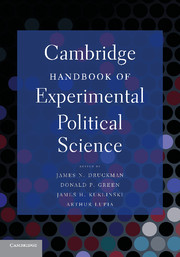Book contents
- Frontmatter
- Contents
- List of Tables
- List of Figures
- Contributors
- Acknowledgments
- INTRODUCTION
- PART I DESIGNING EXPERIMENTS
- PART II THE DEVELOPMENT OF EXPERIMENTS IN POLITICAL SCIENCE
- PART III DECISION MAKING
- PART IV VOTE CHOICE, CANDIDATE EVALUATIONS, AND TURNOUT
- PART V INTERPERSONAL RELATIONS
- PART VI IDENTITY, ETHNICITY, AND POLITICS
- PART VII INSTITUTIONS AND BEHAVIOR
- 24 Experimental Contributions to Collective Action Theory
- 25 Legislative Voting and Cycling
- 26 Electoral Systems and Strategic Voting (Laboratory Election Experiments)
- 27 Experimental Research on Democracy and Development
- PART VIII ELITE BARGAINING
- PART IX ADVANCED EXPERIMENTAL METHODS
- AFTERWORD
- Name Index
- Subject Index
- References
24 - Experimental Contributions to Collective Action Theory
Published online by Cambridge University Press: 05 June 2012
- Frontmatter
- Contents
- List of Tables
- List of Figures
- Contributors
- Acknowledgments
- INTRODUCTION
- PART I DESIGNING EXPERIMENTS
- PART II THE DEVELOPMENT OF EXPERIMENTS IN POLITICAL SCIENCE
- PART III DECISION MAKING
- PART IV VOTE CHOICE, CANDIDATE EVALUATIONS, AND TURNOUT
- PART V INTERPERSONAL RELATIONS
- PART VI IDENTITY, ETHNICITY, AND POLITICS
- PART VII INSTITUTIONS AND BEHAVIOR
- 24 Experimental Contributions to Collective Action Theory
- 25 Legislative Voting and Cycling
- 26 Electoral Systems and Strategic Voting (Laboratory Election Experiments)
- 27 Experimental Research on Democracy and Development
- PART VIII ELITE BARGAINING
- PART IX ADVANCED EXPERIMENTAL METHODS
- AFTERWORD
- Name Index
- Subject Index
- References
Summary
Collective action problems are difficult problems that pervade all forms of social organization from within the family to the organization of production activities within a firm and to the provision of public goods (PGs) and the management of common pool resources (CPRs) at local, regional, national, and global scales. Collective action problems occur when a group of individuals could achieve a common benefit if most contribute needed resources. Those who would benefit the most, however, are individuals who do not contribute to the provision of the joint benefit and free ride on the efforts of others. If all free ride, then no benefits are provided.
Political scientists trying to analyze collective action problems have been influenced by a narrow, short-term view of human rationality combining an all-powerful computational capacity, on the one hand, with no capability to adapt or acquire norms of trustworthiness and fair contributions to the provision of collective benefits, on the other. To provide PGs, it is believed that governments must devise policies that change incentives to coerce citizens to contribute to collective action.
Formal analysis of collective action problems has been strongly affected by the pathbreaking work of Olson (1965) on The Logic of Collective Action and the use of game theory (e.g., Hardin 1982; Taylor 1987), which improved the analytic approach to these problems.
Information
- Type
- Chapter
- Information
- Cambridge Handbook of Experimental Political Science , pp. 339 - 352Publisher: Cambridge University PressPrint publication year: 2011
References
Accessibility standard: Unknown
Why this information is here
This section outlines the accessibility features of this content - including support for screen readers, full keyboard navigation and high-contrast display options. This may not be relevant for you.Accessibility Information
- 5
- Cited by
